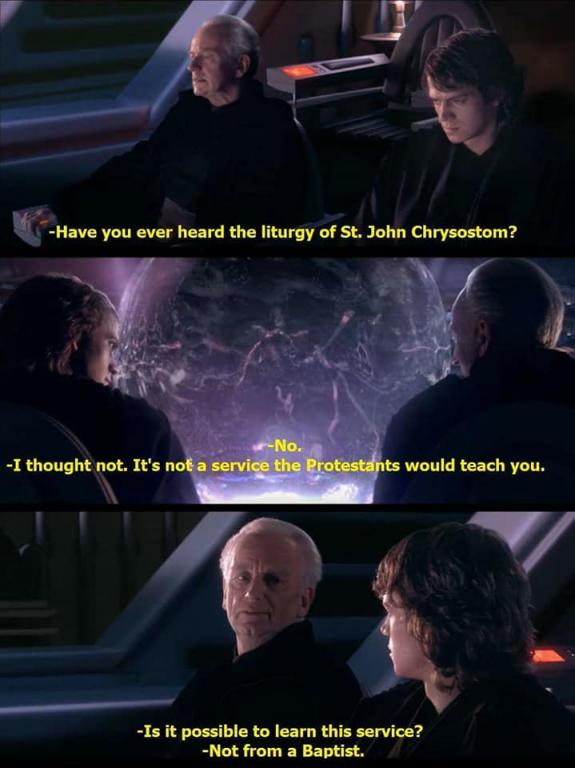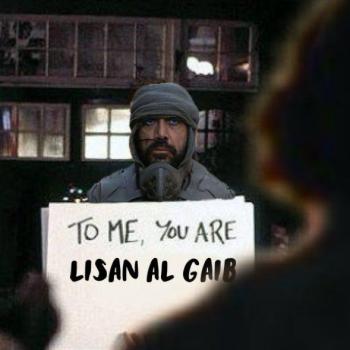I wrote a blog post in 2005, soon after seeing the final installment of the Star Wars prequel movies that George Lucas made. This was on my first blog which came to be back when one had to install special software and host a blog on one’s own web space. My how things have changed. It is interesting to consider that Lucas told a story that, because of the order, ended with only a hint of hope in the midst of gloom. Of course, telling a prequel that works, but it is still an unconventional approach to begin with hope, journey along a gloomier path to a victory of good and redemption, and then to go back and tell stories of innocence, compromise, and betrayal.
Here is what I wrote in 2005. I won’t alter my words after having seen this movie again multiple times since then and also having seen additional Star Wars movies and television shows. Having taught the franchise recently I am struck by how well my insights from a decade and a half ago stand the test of time, and agree with the kind of thing I have written about the franchise just within the past few days:
Well, the final installment in the Star Wars series has appeared, and it is pretty great. All one has to do is attribute the weepiness of Padme to hormones to make that plausible, given her strength in the previous two episodes. As for the speed with which Anakin goes from wanting to kill Palpatine for being a Sith, to killing Jedi younglings, I chalk it up to the need to deal with developments of personality in a 2-hour film that normally take significantly longer.
It is interesting to look at the whole question of relativism in the Lucas universe, since it is explicitly brought to the fore in this episode. On the one hand, the force has a ‘dark side’, but is it evil? The Jedi definitely say yes, but they are willing to compromise their values when they think it ‘serves a higher good’. That includes spying on Palpatine even though it is treason, and killing Palpatine even when he is unarmed.
Is it still treason if the guy is evil? Yes, but maybe it is justifiable treason. But that is the whole point, the big issue that Episode III raises. Is there a clear line between right and wrong, one that can be seen clearly in the heat of the moment? Anakin, provoked by Palpatine, decides that Dooku is too dangerous to keep alive. Mace Windu, one of the greatest Jedi masters, reaches the same conclusion about Palpatine on his own! How evil does your enemy have to be for it to be OK to compromise your principles? Should one have principles in terms of absolutes…such as ‘Never kill an unarmed prisoner.’ Why should the fact that you have disarmed the person make a difference in every circumstance? Can a person capable of throwing lightning bolts be disarmed anyway? As an older, perhaps wiser Ben Kenobi says in Episode VI, many things depend on your point of view.
When Anakin ‘brings balance’ at the end of ROTJ, it is not only (perhaps not even primarily) by tossing the Emperor to his death. Luke is just becoming a Jedi, and so clearly the Jedi of the title who returns is Anakin. He and Luke show that Yoda was wrong when he said ‘Once you start down the dark path, forever will it control your destiny.’ Nor was Obi-Wan being honest when he said ‘Only a Sith thinks in absolutes’. The Jedi say that the Sith are pure evil, and they believe themselves to be pure good (more or less). What Anakin proves and Luke believes is that people (and the force) are much more complex than either the Sith or the Jedi have historically acknowledged. It is possible to get angry at injustice, at mistreatment of others, and yet to not let it consume you. It is possible to form attachments and yet not cling to them so tightly that they make you become greedy. Presumably it is in keeping with this that the new Jedi order has Luke married to, and having children with, a redeemed sith (although I haven’t read those books so I can’t really comment more than that). What Anakin does is something greater – or I should say, more difficult – than simply killing an evil enemy. He gets enticed by evil and falls, and yet finds his way back.
One could argue that Anakin brought balance to the force in this movie. The Sith were the underdogs for millenia. The Jedi regarded the different sides or the force as polar opposites. But in fact, they need to be kept in balance – like yin and yang, they are not opposites, but two sides of a coin that cannot exist in total independence of one another. That is what Luke discovered in Episode VI – that one can allow one’s anger to give one focus, but one also needs to stop before it consumes you, when the balance of ‘an arm for an arm’ has been reached. You can form attachments and genuinely care about people, without becoming so attached that you will compromise your values for them. And rather than killing one’s enemy, the ideal is to win them back, to redeem them.
If you haven’t seen Episode III yet, I highly recommend it. There are some very entertaining bits involving R2D2, Palpatine is not only great as a lightsaber-wielding Sith but is also highly entertaining as well. And two thumbs up to Hayden Christensen, for portraying a believable Anakin Skywalker and a believable Darth Vader, and getting us to feel the confusion, tension and pain as the one develops into the other.
Of related interest, here is a bit of Star Wars-meets-religion humor:














